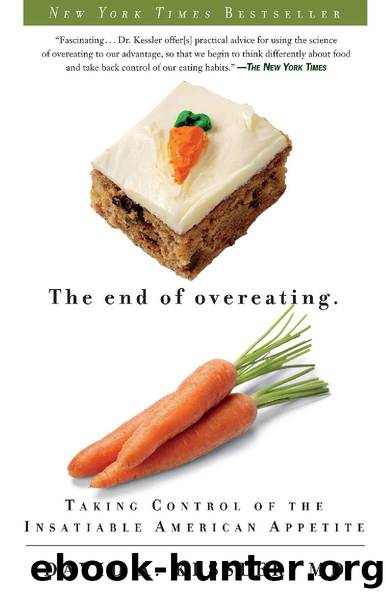The End of Overeating by David A. Kessler MD

Author:David A. Kessler, MD [David A. Kessler, MD]
Language: eng
Format: epub
ISBN: 9781605297859
Publisher: Rodale
Published: 2009-07-15T00:00:00+00:00
The third element of habit reversal is formulating thoughts that compete with, and serve to quiet, the old ones. “I think we take for granted how much of what we do is verbally mediated, governed by talking our way through a problem,” said the Canadian psychologist Philip David Zelazo. In essence, we write a cognitive script that helps us carry out new behavior and deal effectively with the old.
Our thoughts, and the language we use to express them, can remind us of the consequences of bad habits, guide us to other actions, and heighten the reinforcement value of success. We can introduce ideas that countermand others. Instead of “That pint of chocolate ice cream looks really good to me; I’ll have just a few bites,” we can say to ourselves, “I know that I can’t have one bite, because it will lead to twenty.” We can remind ourselves of our goals: “If I don’t eat that now, I’ll feel better about myself tomorrow.” Or we can repeat statements of self-efficacy: “I don’t have to respond that way; I can respond this way,” or “I can do this; I can control this.”
Instead of responding habitually to the promise of immediate reward, we can make ourselves conscious of the long-term impact of eating highly palatable food. This shift of attention is a tool for gaining cognitive control that “involves changing the way you think about the meaning of the stimulus,” according to Kevin Ochsner, who studies the psychological and neural processes involved in emotion, self-regulation, and perception at Columbia University.
By learning to think not only of the pleasure of a sugar cookie but also of its direct contribution to weight gain, we can begin to seize cognitive control. “Thinking about outcomes changes how you feel about the situation,” Ochsner explained.
By changing the way we talk to ourselves about food, we can endorse new ways of thinking and learn how to shift the meaning we assign to something we once wanted. “You’re providing a mental reimagining of the stimulus and using that to control your behavior,” said Ochsner.
Download
This site does not store any files on its server. We only index and link to content provided by other sites. Please contact the content providers to delete copyright contents if any and email us, we'll remove relevant links or contents immediately.
How to Be a Bawse: A Guide to Conquering Life by Lilly Singh(7486)
Deep Work by Cal Newport(7085)
The Longevity Diet by Valter Longo(5065)
The Fat Loss Plan by Joe Wicks(4921)
The Four-Pack Revolution by Chael Sonnen & Ryan Parsons(3980)
The Ultimate Bodybuilding Cookbook by Kendall Lou Schmidt(3945)
The French Women Don't Get Fat Cookbook by Mireille Guiliano(3662)
Not a Diet Book by James Smith(3429)
Super Food Family Classics by Jamie Oliver(3419)
Factfulness_Ten Reasons We're Wrong About the World_and Why Things Are Better Than You Think by Hans Rosling(3239)
Turn Up Your Fat Burn! by Alyssa Shaffer(3217)
Self-Esteem by Matthew McKay & Patrick Fanning(3144)
Tom Kerridge's Dopamine Diet: My low-carb, stay-happy way to lose weight by Kerridge Tom(3110)
Body Love by Kelly LeVeque(3060)
The Unbecoming of Mara Dyer by Michelle Hodkin(3048)
Tone Your Tummy Type by Denise Austin(2847)
The Fat Chance Cookbook by Robert H. Lustig(2836)
LL Cool J's Platinum 360 Diet and Lifestyle by LL Cool J(2736)
Men's Health Best by Men's Health Magazine(2604)
